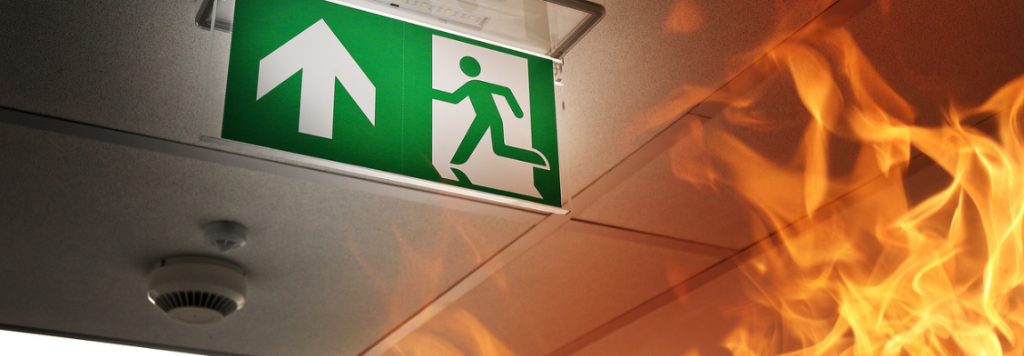Home » Residential » Tenant Guides » Fire Safety
Fire Safety Guide for Tenants

What to do in the event of a fire
- If a smoke alarm is heard or a fire is detected, you need to act quickly and calmly.
- Alert everyone in the household (this could be your flat or house, not the whole building if you live in a block of flats).
- If there’s smoke, keep low. Smoke and hot gases rise, so the air will be clearer low down.
- Always keep window and door keys where everyone can find them on the planned escape route.
- Make sure you check doorknobs with the back of your hand before opening them – the fire could be on the other side.
- Get out of the house as quickly as possible, closing all doors behind you.
- Follow a planned escape route and never use a lift – proceed down the stairs.
- Don’t try to pick up valuables or possessions.
- “Get out, stay out and call 999” – Call the fire service on 999 as soon as possible from outside your house.
- Never go back into your home until a fire fighter or a member of staff from Purple Frog/your landlord has said it is safe to do so.
If you are cut off by fire
- Keep doors and windows closed and get everyone to the safest room with a window, that is furthest away from the smoke/heat entry point.
- If you are unable to call the fire service, open the window, try to attract the attention of others who can alert the fire brigade, shout FIRE!
- Close the door and put bedding or any soft materials around the bottom and sides to block the smoke coming in.
- If you’re on the ground or first floor, you may be able to escape through the window. Use soft materials to cushion your fall and always lower yourself down slowly and carefully. Get out feet first and lower yourself until your arms are fully extended before dropping.
Tenants with a disability
Disabled tenants should have fire safety devices and procedures in place to consider their requirements in the event of fire. For example, if you are hard of hearing, then strobes and vibrating pad devices will likely be a better warning than an auditory fire alarm.
If you have a disability which may impact evacuation of the building in the event of a fire then you must let us know at the time you are signing your tenancy agreement; if you have already signed your tenancy and not let us know, please do so immediately by emailing ops@purplefrogproperty.com.
If you have mobility difficulties it is advisable to select a bedroom on the ground floor or, if this is not possible, have it as close to the nearest exit as possible.
Escape routes
It is essential that all escape routes both inside your flat/house and in any communal corridors, are kept clear of any items, including bikes and rubbish etc. In the event of a fire, items left in these areas could prevent you or other tenants from escaping the building.
It is important that you familiarise yourself with the escape routes in your home. For most houses the simple way to evacuate will be via the front door; alternative escape routes may include your back door, or any windows on the ground or first floor which open sufficiently and have a safe area underneath.
In larger buildings, escape routes will be indicated by light, or reflective signage.
Meeting point
In larger buildings, there will be signage around the building advising you where to meet after evacuating the building. In a the absence of any instructions, your meeting point will be the pavement of the road opposite the building.
Fire Doors
Unless indicated on the door, fire doors are designed to stay closed, this helps to prevent the spread of fire so as to give you and other tenants sufficient time to escape the property. You must keep your fire doors closed at all times.
Cooking
Cooking should not be left unattended; all equipment should be visually inspected before use to ensure it is undamaged and in good working order.
Any portable electrical equipment has been safety checked (see portable appliances below), this should any equipment brought into the property.
Extension cables
- The misuse of extension cables can cause fires.
- Wherever possible, minimise the use of extension leads in your home. As a general rule, please use one plug socket for one plug.
- Avoid the use of block adaptors with multiple sockets
- Never plug one extension lead into another.
- If you are using extension leads make sure they are subject to the same in-service inspection regime (‘PAT testing’) as other portable electrical appliances (See Portable Appliances below).
Portable appliances
Your landlord is responsible for portable appliance testing (PAT) for the the appliances they provide around your property, this may include vacuum cleaners, TV’s etc.
It is your responsibility to make sure any appliances you bring into the property are safe and that you use them correctly. Appliances should be tested once per year. You can find more information here about having your appliances tested.
Please take extra care when using high risk items such as hair straighteners
Rubbish
The correct bins should be used for storing your waste. In larger buildings communal bins are available, other properties have wheelie bins provided, and some have metal bins provided in gardens. Your rubbish should not be stored in the communal areas of your home, or outside the property unless in the bins provided.
If you don’t have sufficient waste storage available, please contact your property manager.
